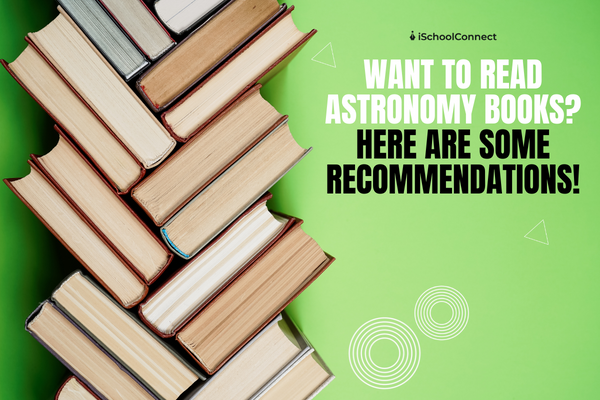Table of Contents
The best astronomy books will serve as a constant guide to help you learn more about the universe. Some are literal sky tours, while others will educate you on the culture, history, and other implications of the universe around us. Learning about the sky usually starts with identifying the constellations and the brightest star. Here are some astronomy books to enlighten you throughout your reading journey.
The Backyard Astronomer’s Guide

Authors- Terence Dickinson, Alan Dyer
Publisher- Firefly Books
The fourth edition of The Backyard Astronomer’s Guide is now available. The 2021 edition, first published in 1991, includes 48 additional pages and five new, up-to-date chapters. The latest edition, brilliantly compiled by authors Terence Dickinson and Alan Dyer, brings the book powerfully into the modern era of astronomy.
The guides cover everything from the aperture, power, and optical design to mounts and filters, with handy photographs to ensure the reader understands the distinction between a Newtonian and Maksutov telescope or an altazimuth and Go-To mount.
The pages include sky tours, star charts, future astronomical events, and an extraordinary short Moon tour by astronomy communicator Ken Hewitt-White. The authors help beginners manage their expectations by giving honest advice like ‘leave astrophotography to the end’- an important lesson many first-time astronomers overlook.
Cosmos
Author- Carl Sagan
Publisher- Random House
This book inspired not one but two ‘Cosmos’ television series. Carl Sagan, a planetary scientist and astronomer wrote the book, which bills itself as a journey through nearly 14 billion years of cosmic evolution. The book tries to look beyond space to aspects like the human brain and Egyptian hieroglyphics.
Sagan died in 1996, but you can see his books reprinted numerous times. This one covers everything from spacecraft missions to galaxies’ evolution and how our sun might die. It also looks at influential people in modern science. Although some of the information is outdated, the prose remains an elegant example of Sagan’s scientific communication.
The Secret World of Stargazing
Author- Adrian West
Publisher- Hodder & Stoughton
Adrian West has written an enchanting book emphasizing well-being- how and why stargazing benefits our physical and mental health. It is a book for anyone who is just getting started and finding their stargazing feet for the first time and anyone with a passing interest.
The Secret World of Stargazing is a captivating book. It’s intimate, delicate, and beautifully innocent. For more experienced astronomers, it reminds us why so many of us enjoy the hobby. It serves as a helpful stepping stone onto the first rung of the stargazing stairway for those just getting started.
The Disordered Cosmos
Author- Chanda Prescod-Weinstein
Publisher- Bold Type Books
Chanda Prescod-Weinstein’s memoir and physics discussion approach the subject of science from various perspectives. You’ll hear about stars and other science-related topics here, but you’ll also hear about how the community can improve its representation.
Prescod-Weinstein, an astronomy professor at the University of New Hampshire, is one of less than 100 Black American women to earn a Ph.D. from a physics department. As such, she discusses how she sees the need for the community to recoup from a legacy of sexism, racism, and many other concerns. Her mission is to assist everyone in better participating in discovering the universe and learning about its significance in our lives.
The Invisible Universe

Author- Matthew Bothwell
Publisher- Oneworld
One frequently considers astronomy a visual field with a strong emphasis on what we can see. Matthew Bothwell’s The Invisible Universe explores the bits we can’t see- which is a disservice because those ‘bits’ account for the vast majority of the cosmos.
Most chapters concentrate on a specific part of the spectrum or a particular discovery. Each case’s narrative takes the reader through a potted history, including some recent findings.
Concepts have a thorough explanation throughout the book, with metaphors and analogies used to create an approachable writing style. The author’s day job as an observational astronomer shines through, and there are amusing anecdotes about trips to telescopes in Hawaii and Chile, as well as a few from his home base at the University of Cambridge, steeped in astronomical history.
Brief Answers to the Big Questions
Author- Stephen Hawking
Publisher- John Murray
‘How did it all start?’ Is there intelligent life elsewhere in the Universe? ‘Can you travel back in time?’ These are just a few of the critical issues addressed by Stephen Hawking in his final book. Hawking does not simply provide one-word answers but walks us through his unique thoughts and divergences on each subject. The language is simple, and the length of each chapter keeps you interested. The book does touch on some complex physics at times, but you will never feel lost. Many impressive parts will stick with you and shape your future thinking about these big questions.
2022 Night Sky Almanac
Author- Nicole Mortillaro
Publisher- Firefly Books
Nicole Mortillaro, a science journalist and long-time member of the Royal Astronomical Society of Canada, created this highly portable star guide. It’s a comprehensive guide designed to introduce beginners to the sky and its strange objects, such as comets, stars, and globular clusters.
It’s jam-packed with moon phase charts, sky maps, and other data to keep you updated on 2022 events. You’ll also learn how to take hand measurements of the sky, the fundamentals of binoculars and telescopes, and a few astronomy terms to help you understand the universe better. The data makes this a helpful book for beginners to intermediate astronomers.
Key takeaways
- If you aspire to make the universe your friend, you must read some of the best astronomy books. They will help you get the hang of the space and its mysteries.
- Some books even teach you beyond the human brain and Egyptian hieroglyphics, while others help you understand astronomy more straightforwardly.
- Authors like Chanda Prescod-Weinstein write for the betterment of a community and help them overcome issues like racism and sexism.
Did you find this blog informative? Do let us know your thoughts and views in the comments below. Click here to contact us for more information on astronomy books. We would be happy to oblige with your queries.
Liked this blog? Read next: Things you must know about the study of the earth!
FAQs
Q1.Which book is best for astronomy beginners?
Answer- Astronomy: A Beginner’s Guide to the Universe by Eric Chaisson and Steve McMillan, The Astronomy Book: Big Ideas Simply Explained by DK, and The Universe in a Nutshell by Stephen Hawking are some of the best astronomy books for beginners.
Q2. What’s the difference between astrology and astronomy?
Answer- Astronomy is the study of the universe and its contents beyond the atmosphere of Earth. Astronomers study celestial objects’ positions, motions, and properties. Astrology studies how these positions, movements, and properties affect people and events on Earth.
Q3. Which branch of astronomy is best?
Answer- Astrophysics is a popular and well-known branch of astronomy that relies on effectively applying various physics principles in astronomy.







